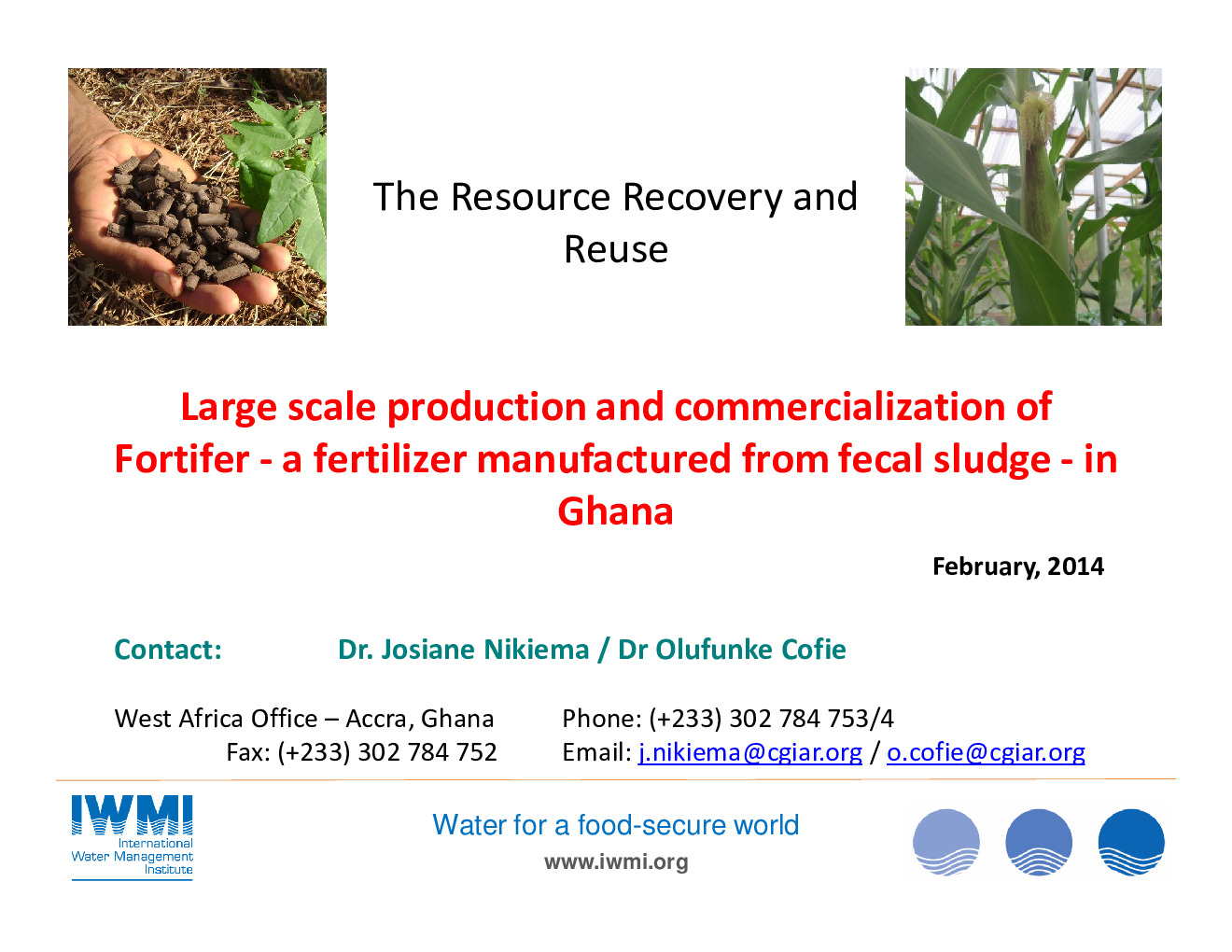-
Containment Collection and transport Treatment Disposal / Reuse
-
Capacity building Finance Information Education and Communication / Behavior Change Communication Infrastructure Policy and processes Technology
-
Access to sanitary toilets Better governance and planning Change in disease burden Collection efficiency of sanitation system Cost recovery Environmental sustainability through reuse, resource recovery, conservation Equity and social inclusion Private sector engagement Quantity of waste safely treated Sanitation practices of the supply side Sanitation practices of the end user
-
Faecal sludge treatment by vermifiltration - proof of concept
The objective of this study was to determine if composting worms and their cocoons are able to survive in and digest faecal sludge. Eighteen vermifilters with different worm and cocoon densities were set-up, fed with faecal sludge (from portable pour-flush toilets) and ran for 38 days. Samples of the sludge, effluent and vermicompost were analysed for pH, total solids, chemical oxygen demand, faecal coliforms and Ascaris spp. number and viability. Worm and vermicompost mass, and cocoon numbers were assessed at the end of this period. It was found that the composting worms survived in these conditions and cocoons hatched. The validity of the sludge analysis results are questioned in this paper and without these results only estimates of effluent treatment and solids conversion could be made. Although this study was not completely definitive it has shown that worms are capable of converting faecal sludge into vermicompost and cocoons hatch in its presence. This trial was undertaken in India.
-
Framework Conditions for Private Service Delivery in Faecal Sludge Management in Kampala
Sanitation issues are some of the most significant development challenges for Kampala City, Uganda. Like many other capital cities in developing countries, Kampala is experiencing rapid population and economic growth. However, provision of key services including adequate sanitation for the city population has not been in tandem with these developments.In Uganda, piped sanitation systems are available only to a very limited extent of the urban population. In Kampala, about 90% of the people rely on on-site sanitation solutions, a greater proportion of which cannot be considered “improved” or “acceptable” in most cases: too many households share one toilet, leading to unhygienic conditions; pit-latrines are unlined, filled with solid wastes, and hard to access for emptying services, ultimately leading to filled-up facilities that are either abandoned or directly emptied into the environment, posing health and environmental risks for the city and its people. High population growth rates and increasing urbanisation add to the fact that especially in poor urban areas and informal settlements, access to sanitation is inadequate and collection, transport as well as treatment of faecal sludge remain a great challenge.
-
FSM 3 Conference - Workshop 1B - Planning Tools for City-wide Faecal Septage Management using Whole System Approaches
Given the critical role of septage management in supporting rapidly urbanizing cities in developing nations as a solution, the FSM3 conference provided an ideal opportunity to understand and reflect on whole system approaches. This included generating knowledge for the development of FSM planning tools and instruments and testing practical and implementable tools to advise cities in upgrading sanitation.All workshop presentations are available onhttp://www.susana.org/en/resources/conference-materials-2/2015/261-fsm3-ws-1b
-
FSM 3 Conference - Workshop 1B - Planning Tools for City-wide Faecal Septage Management using Whole System Approaches
Given the critical role of septage management in supporting rapidly urbanizing cities in developing nations as a solution, the FSM3 conference provided an ideal opportunity to understand and reflect on whole system approaches. This included generating knowledge for the development of FSM planning tools and instruments and testing practical and implementable tools to advise cities in upgrading sanitation.All workshop presentations are available onhttp://www.susana.org/en/resources/conference-materials-2/2015/261-fsm3-ws-1b
-
FSM 3 Conference - Workshop 1B - Planning Tools for City-wide Faecal Septage Management using Whole System Approaches
Given the critical role of septage management in supporting rapidly urbanizing cities in developing nations as a solution, the FSM3 conference provided an ideal opportunity to understand and reflect on whole system approaches. This included generating knowledge for the development of FSM planning tools and instruments and testing practical and implementable tools to advise cities in upgrading sanitation.All workshop presentations are available onhttp://www.susana.org/en/resources/conference-materials-2/2015/261-fsm3-ws-1b















